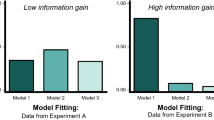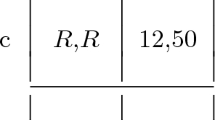Abstract
We propose and implement a Bayesian optimal design procedure. Our procedure takes as its primitives a class of parametric models of strategic behavior, a class of games (experimental designs), and priors on the behavioral parameters. We select the experimental design that maximizes the information from the experiment. We sequentially sample with the given design and models until only one of the models has viable posterior odds. A model which has low posterior odds in a small collection of models will have an even lower posterior odds when compared to a larger class, and hence we can dismiss it. The procedure can be used sequentially by introducing new models and comparing them to the models that survived earlier rounds of experiments. The emphasis is not on running as many experiments as possible, but rather on choosing experimental designs to distinguish between models in the shortest possible time period. We illustrate this procedure with a simple experimental game with one-sided incomplete information.
Similar content being viewed by others
References
Boylan R, El-Gamal M (1993) Fictitious play: A statistical study of multiple economic experiments. Games and Economic Behavior 5: 205–222
Edwards W, Lindman H, Savage L (1963) Bayesian statistical inference for psychological research. Psychological Review 70: 193–242
El-Gamal M, Grether D (1995) Uncovering behavioral strategies: Likelihood based experimental data mining. Journal of the American Statistical Association. 90 (432): 1137–1145
El-Gamal M, Palfrey T (1995) Vertigo: Comparing structural models of imperfect behavior in experimental games. Games and Economic Behavior 8: 322–348
El-Gamal M, McKelvey R, Palfrey T (1993a) A Bayesian sequential experimental study of learning in games. Journal of the American Statistical Association 88: 428–435
El-Gamal M, McKelvey R, Palfrey T (1993b) Computational issues in the statistical design and analysis of experimental games. International Journal of Supercomputer Applications 7/3: 189–200
Fisher R (1950) Contributions to mathematical statistics. New York, Wiley
Harless D, Camerer C (1992) The predictive utility of generalized expected utility theories. Mimeo, University of Chicago
Kullback S (1959) Information theory and statistics. New York, Wiley
Lehmann L (1959) Testing statistical hypotheses. New York, Wiley
Lindley D (1957) A statistical paradox. Biometrika 44: 187–192
McKelvey RD, Palfrey T (1992). An experimental study of the centipede game. Econometrica 60: 803–836
Author information
Authors and Affiliations
Additional information
We acknowledge the financial support from NSF grant #SES-9223701 to the California Institute of Technology. We also acknowledge the research assistance of Eugene Grayver who wrote the software for the experiments.
Rights and permissions
About this article
Cite this article
El-Gamal, M.A., Palfrey, T.R. Economical experiments: Bayesian efficient experimental design. Int J Game Theory 25, 495–517 (1996). https://doi.org/10.1007/BF01803953
Received:
Revised:
Issue Date:
DOI: https://doi.org/10.1007/BF01803953




